· 17 min read
Creating Your Own Good Company – An Interview With Chasing Carrots

Edward Price
Community Manager at GameAnalytics
We spoke to Paul Lawitzki about making a community from unlikely places, maintaining a healthy work culture and knowing when it’s okay to put that project on hold, and creating a good company in their upcoming title Good Company, a charming 80s pastiche that sees you creating your own robot manufacturing empire. We did not talk about Skynet.
What is your role in the team, and how did you end up working at Chasing Carrots?
I’m programmer and lead game designer at Chasing Carrots. Formally, my employment started in April 2017, but I’ve known the team for much longer; I worked here as a freelance programmer and project lead on Pressure Overdrive for more than two years before my permanent employment.
[bctt tweet=”How do you create a community, maintain a healthy work culture, and know when it’s okay to put that project on hold? @Chasing_Carrots have the answers in this interview:” username=”GameAnalytics”]
The first time I met them was in January 2014. They were organizing the global game jam in Stuttgart and our producer Josef was handling the jam registration. I showed up at the site and I was taken by surprise when he mentioned to me that he had played a Ludum Dare game I had made a few weeks before. That was one of the most serendipitous events in my life. Throughout the following months I got to know the team and developed a growing fondness for them.
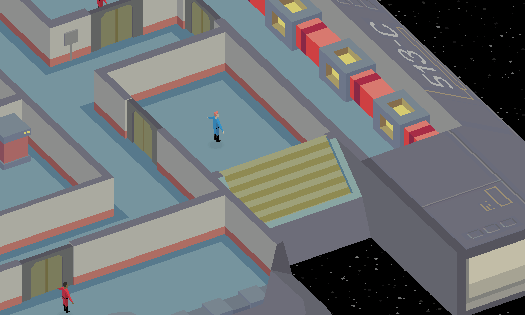
What is the culture like within the company?
We have a very harmonic, caring, and quiet atmosphere. The relationships here are less like ‘just colleagues’ and more like ‘good or close friends’ in an uncomplicated familial way, which is probably true for most smaller indie teams. There are no superiors or subordinates, everybody is invested in the project and there’s a high trust that everyone will meet their responsibilities. If you ask for honest feedback, you’re guaranteed to get it.
Somehow food has become an important part of our culture: we have a kitchen in our office which is used everyday to prepare lunch for the whole team (except Friday, that’s fast-food day). There’s a white board where we vote on what’s next for lunch, or write down suggestions. We take turns with cooking, depending on who has currently the lowest expenses on groceries. Also, some of us love spicy hot dishes. Dominik, one of our co-founders, is even growing his own Carolina Reapers here at the office!
What is Stuttgart like in terms of games development in comparison to other areas and countries?
In terms of game development Stuttgart is not on the forefront or has that many professional studios in the area, but we have a lot of educational facilities with game-focused studies, and maybe more developers will found their companies in Stuttgart.
In Germany cities like Berlin, Hamburg, Munich and Frankfurt have the most studios, but that’s a different story and the same goes for other countries.

Do you think Stuttgart is the ideal place for Chasing Carrots, or do you think there’s a potential for the company to branch out elsewhere in future?
We are pretty much rooted here. We are aware of the fact that right now there are better places to be regarding making games and sometimes it might feel a little bit like being at the sidelines, but this situation is slowly changing and we are contributing to this change. The support in our region is getting better and education in game development here is on the rise as well.
Of the titles you’ve made so far, they’re quite different in terms of genre, gameplay, and setting. Is this deliberate?
We pick our projects very carefully. However, we tend to ignore genre boundaries. We don’t decide to make an RPG or an RTS, that would create unnecessary constraints during the conception of a project. We’d rather think in terms of, what is a game about, what it should feel like and try to emphasize these aspects. The genre (or more often the genre mix) is an implicit result of this process. So, I think there is less deliberation regarding the genre but all the more when it comes to particular game ideas.
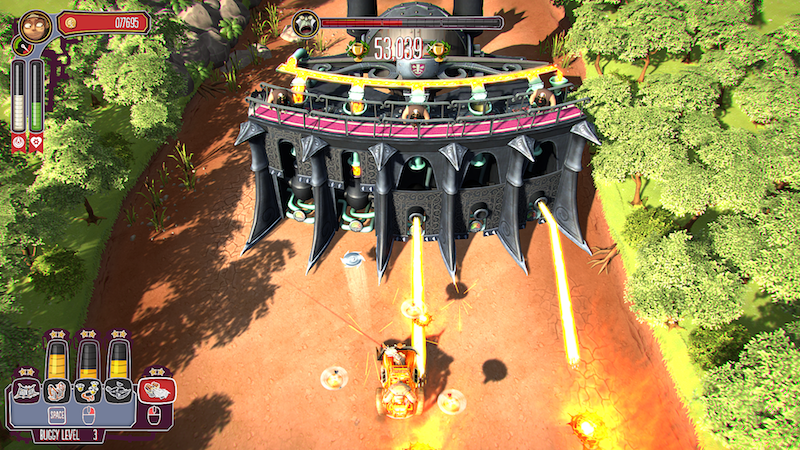
You also organise game jams in your local area – how much attention do these receive, and how does it feel to give back to the gaming scene in this way?
Since we have some universities and other relevant educational facilities nearby there is a pretty good reception regarding game jams. For the last two years we were in the top 5 locations in Germany when it comes to the participant numbers for the Global Game Jam. Giving back to the gaming scene is good thing and we think it’s crucial to establish a growing development scene in our region. It takes some effort and work, but in the end, it is totally worth it.
How important are game jams to the company in terms of a creative outlet and ideas for future projects?
Game jams allow us to try out crazy stuff and get ideas out of our system. Those of us who actively work on game design are continuously coming up with new stuff that has nothing to do with our current projects. It’s just how the creative process works: you cannot create new and fresh ideas without getting sidetracked. Working on these new things, even for a short while, can be very liberating and can help you to focus again or even gain new perspectives.
At the same time game jams are also great opportunities to throw out random things and see what sticks. We’ve made a lot of tiny games during game jams and a small subset of them feel like they could be taken further into bigger game projects. For instance, the initial prototype for Heart of Scrap was made during a game jam.
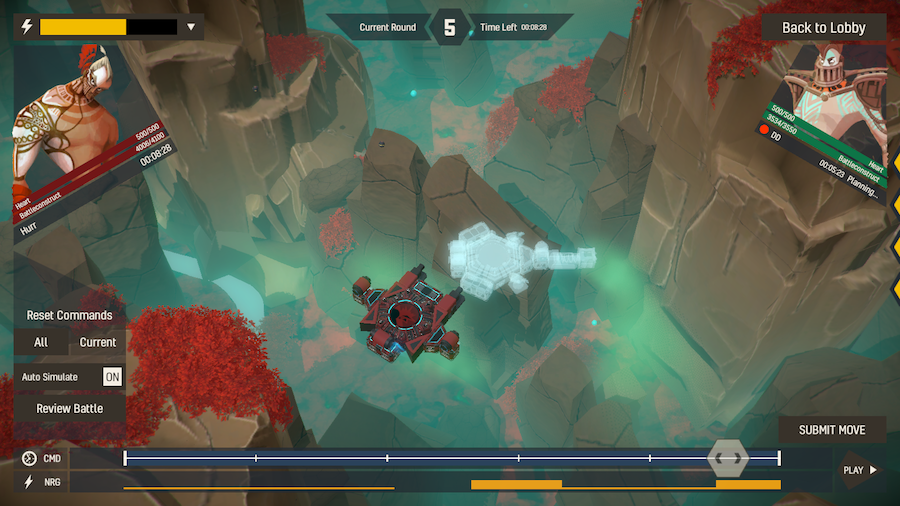
What kind of organisation goes into a game jam for Chasing Carrots? Do you try to keep to a theme, or is it just whatever people want to try out?
We are hosting the site in Stuttgart during the annual Global Game Jam; we find and book a location with sufficient infrastructure, acquire sponsors, organize the catering, and reach out to the local public to find participants. This year we had fantastic cooperation with the Stuttgart city library. they supported us with a large space and personnel so people could stay over night and work on their games if they wanted to. The event is growing every year, and this time around we had just under 70 participants. On these occasions we have no influence on the theme since it is set by the GGJ Executive Committee.
We discovered that for us (as participants) having a theme is not that important, but it might help novice jammers to find out what kind of game they want to make by narrowing down the spectrum of ideas. When participating in jams, we often find ourselves just picking some dusty idea from the mental shelf (the one we’ve been contemplating the most recently) and fitting it to the theme. So, I think if we host a jam outside of the GGJ that we would take a more hands-off approach.
Have there ever been any great ideas you’ve seen at one of these game jams that’s gone on to become a full-time project at Chasing Carrots, or any that you wish you’d thought of yourself?
Since game jams are often about the process and less about the actual results, idea-wise they are kind of a mixed bag. Still, it’s happened several times that after we finished a jam game, we felt like this could become a full-fledged game. One jam result in particular even made it to a full-time project: Heart of Scrap. The jam prototype was originally made in Flash, it was an asynchronous-two-player-turn-based-space-ship-construct-’em-up. Each player could construct a space ship out of a set of building blocks (as well as engines, turrets, armor plates). After that, the players could define commands to each functional block of their ship. Both players then submit their commands and the battle is simulated for a short period of time before the players can enter their commands for the next turn. We went past pre-production with this and presented an early alpha version at gamescom, but we had to put the project on hold in favour of Good Company.
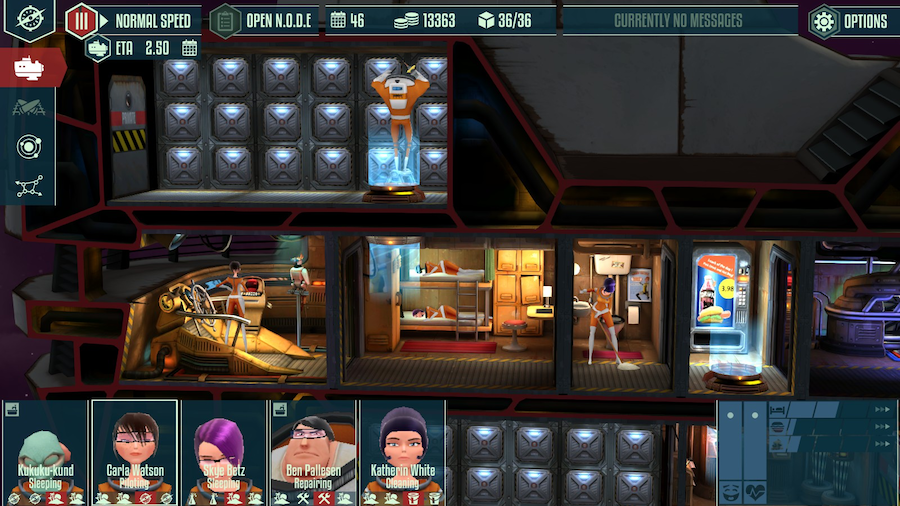
As a self-funded company, you always get the freedom to create whatever you want. Is it easier to work on projects you’re so passionate about, or is there always the worry of becoming overly attached and working on it until it’s perfect?
We value our freedom very highly and it’s certainly playing a big factor in how we approach our projects. We couldn’t make the games the way we’re making them right now if we weren’t passionate about them – I think it’s safe to say that the joy of making games is what drives us the most. Over the years we’ve learned to see our work with critical eyes and we became aware of the fact that our perception may vastly differ from our audiences’. We want to make our games in high quality and for them to be as enjoyable as possible, but at the same time we eventually want to get them out of the door. This is an important balance and I think we’ve assumed a healthy and professional perspective on it. I don’t think that attachment or perfectionism are big issues in our team.
Where did the idea for your latest project, Good Company, come from?
That’s a quite an interesting story, actually. After finishing Pressure Overdrive in late summer of 2017 it was planned to continue with Heart of Scrap, a game we’d already put a lot of effort into. However, the development of Pressure Overdrive and its performance on the market gave us a lot to think about, and we started to question Heart of Scrap’s concept. In the middle of the discussion, one of our co-founders mentioned that he had a dream where he was pitching a game to his colleague. The pitch somehow caught on within the entire team. It was simpler, less risky and had an undeniable appeal that was initially hard to pin down. Within a few days the collective decision was made to postpone Heart of Scrap in favour of working on Good Company.
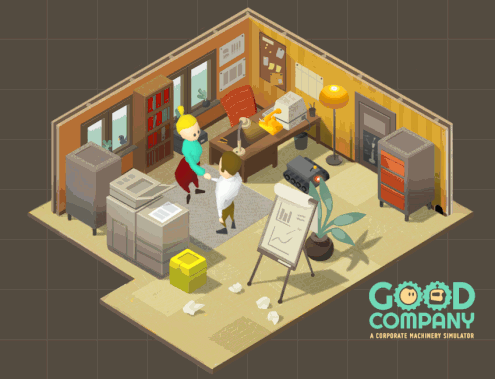
It’s interesting that you mentioned that Heart of Scrap is on hold for an extended period of time; have there ever been any projects that have had to be cancelled entirely? If so, could you tell us more about them?
There was one project in the past that made it past the prototyping phase but was eventually cancelled. It was called “Sticky Beasts”, and it was a physics-based multiplayer monster-riding racing game. Players would compete against each other as they rode weird creatures that could use their extending sticky tongues to get an edge in breakneck monster races. The game was targeted for Xbox 360 and PlayStation 3. Since it would have been very hard to implement AI monster jockeys who could handle the complex physics we had to go with a multiplayer only approach. Unfortunately, this ended up being the main reason for its cancellation, along with the difficulties we saw in building up a multiplayer community from the ground up.
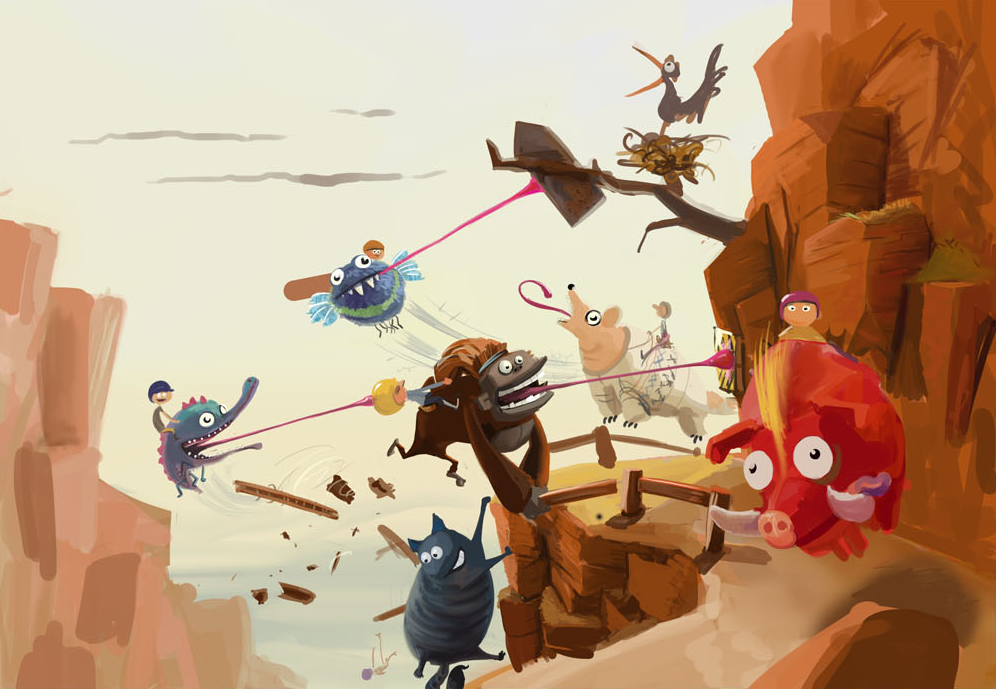
A business simulation game is quite a different genre from your previous games, but are there many lessons you’ve learned from those titles that you can apply to Good Company?
Yes, absolutely! We’ve encountered a ton of pitfalls during each of our previous game projects that apply to game development in general. We’ve also gained a lot of experience on the technical side of things. Genre-wise, Cosmonautica was our previous project that is the closest to Good Company, so there are some game design takeaways that might get useful. After the development of Pressure Overdrive we decided to do something less physics-heavy, as physics simulations are kind of a double-edged sword; they might get hard to control and are definitely hard to test. With Pressure Overdrive we had issues synchronising physics states over the network, which eventually led us to cutting the online co-op feature entirely from the game. That was a painful decision and it wasn’t well received by our players. We want to avoid such scenarios in the future, so we chose the circumstances for Good Company very carefully, especially in regards to the online multiplayer.
After Good Company, is it likely that Heart of Scrap will be the next project, or is it still outside of the realms of feasibility?
That depends on the success of Good Company, of course. Looking at the experience we’ve gained in the last couple of months while working on Good Company, Heart of Scrap feels like it has already moved closer to the realm of feasibility. If everything goes well, it will most probably be our next project.
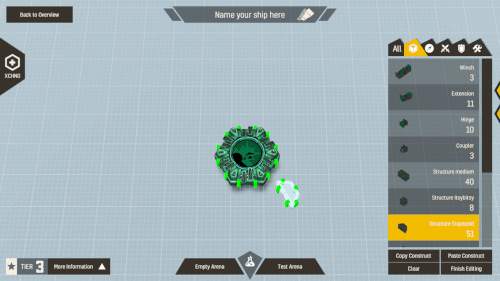
How does the online co-operative multiplayer in Good Company work?
Basically, in a co-op session each player can do the same things they could do in a single player game. Imagine having a big canvas and letting multiple people draw on it simultaneously. That, of course, requires a lot more coordination on the players’ parts, but we want to provide in-game tools that allow the players to plan and communicate more efficiently while building their company.
Have you thought about adding a competitive mode where you get to sabotage your rivals’ companies?
Certainly there are ideas exploring this kind of gameplay, but we’re not ready to talk about these things, yet. We’re still in the process of figuring out a lot of stuff in that direction.
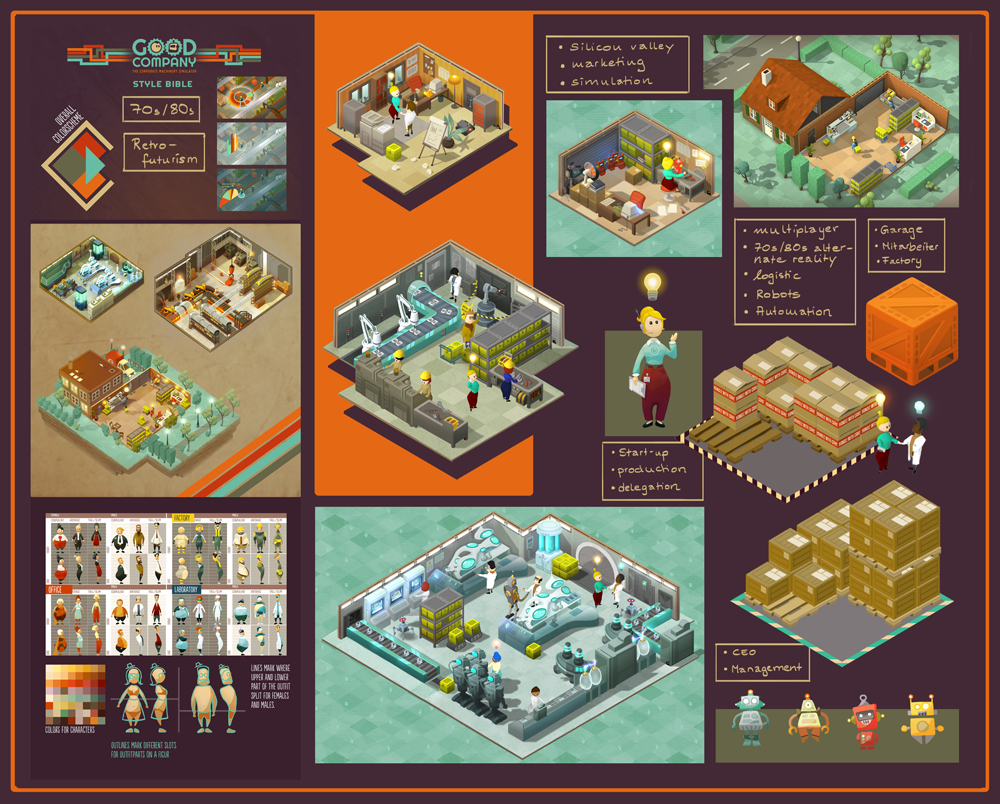
With the co-op designed in the way it is, how hard is it to balance the experience versus playing alone in single player?
Regarding the co-op part of the game, we’ve figured that it won’t be necessary to do a lot of additional balancing. Having more characters controlled by players adds to the potential team efficiency, but with each additional player there is more communication and coordination necessary to stay efficient, so there’s already a sort of natural balance between required effort and team capacity. You can be quicker when playing in co-op, but that won’t overthrow the game balance. Figuring out how to set up and optimize a company is still a task the players have to achieve – having more players doesn’t make a better company. The things you learn while playing solo should be directly translatable to the co-op mode. So, changing the rules between the two modes is out of the question.
What was the decision behind adding in mod support?
We want give players some freedom on what they can do with the game, and Mods are great for this. They might also help us to build a long lasting and dedicated community, as they can significantly increase the lifespan of our game. There’s a lot of benefits to mod support. For example, players have the chance to make a game more realistic by adding real companies, names and products; things a developer isn’t able to do are still possible to players thanks to mods.
You’re releasing intermediate alpha and beta versions during the development of the game, how important do you feel this is to establish the community around the game?
It’s an integral part of both our development and the marketing of our game; we want to have a community-driven development process and a friendly relationship with the people who are interested in the game. Also, developing such a complex game isn’t possible without external information, and what’s more valuable than the opinions of the people who are supposed to play our game? Getting early feedback can help different features and make the game more accessible. We also think that a large group among our players are interested in taking a peek behind the scenes, or are interested in seeing their opinion on the game heard and taken into account.
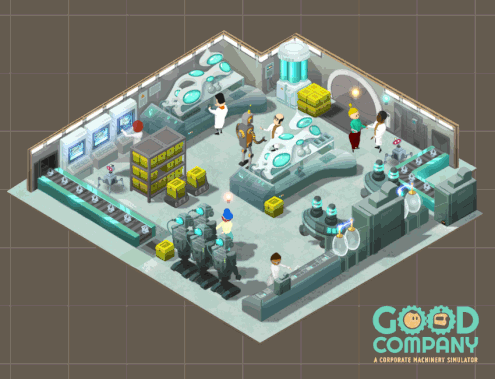
Have you received any game-changing advice or feedback from the community? If so, is there anything you can share with us?
Yes, there are some things we reconsidered after showing a game build to potential players. Keep in mind that we haven’t released a public preview version, yet, but we’ve sent a very early build to selected people first and some of their feedback made us rethink a lot of choices regarding the core mechanic and most of our UI decisions. For example, in our previous iteration, you could save list of tasks and assign them to employees. These tasks said things like “pick up a 10-stack of metal from box A” or “craft product X on crafting table C”. So, you have these task lists and then you must have everything in place for them to work. It felt a lot like programming and turned out to be overly complex and cumbersome. It wasn’t fun at all. We saw that during playtests and decided to implement a different, more accessible mechanic.
What would you say your company’s secret is behind creating games that people will love?
We all have a passion for games, but we also come from very different backgrounds. That leads to interesting ideas and approaches. All in all we fit very well together as a team, professionally and personally. There’s no magic sauce, but a lot of carrots and chilis.
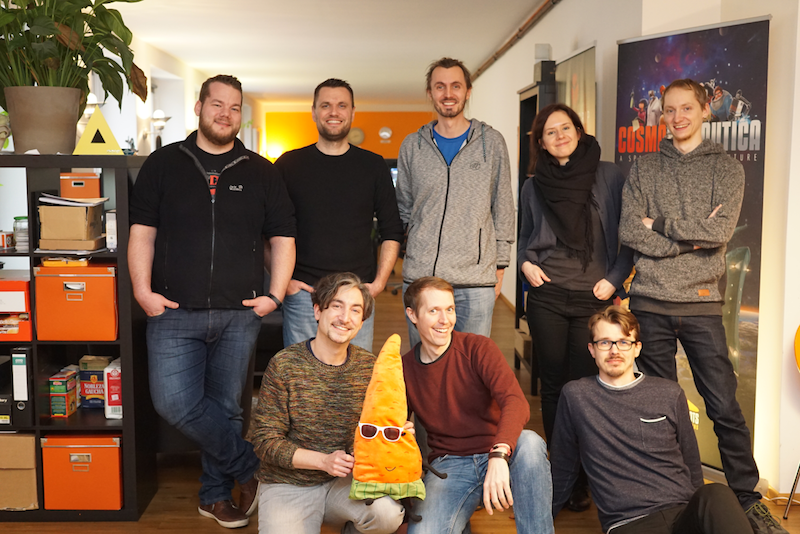
What advice would you give to any would-be developers who want to make games?
You’ll only get really good at something by doing it, failing at it and learning from your mistakes. Start with small games on your own, or look for projects and teams on sites like moddb.com. Participate in game jams, talk to other developers and gather knowledge from all the free articles and resources on the internet (such as gamedev.net, Gamasutra, and Pixel Prospector to name but a few). Don’t get dazzled by success stories, try to find stories of developers who failed (although these can be much harder to find) and learn from mistakes others have made for you.
[bctt tweet=”‘Don’t get dazzled by success stories, try to find stories of developers who failed and learn from mistakes others have made for you.’ Read more wisdom from @Chasing_Carrots here:” username=”GameAnalytics”]
Editor’s Note: Paul can be found on Twitter (@pLawitzki), as can Chasing Carrots (@Chasing_Carrots). Good Company is planned to launch later in 2018.